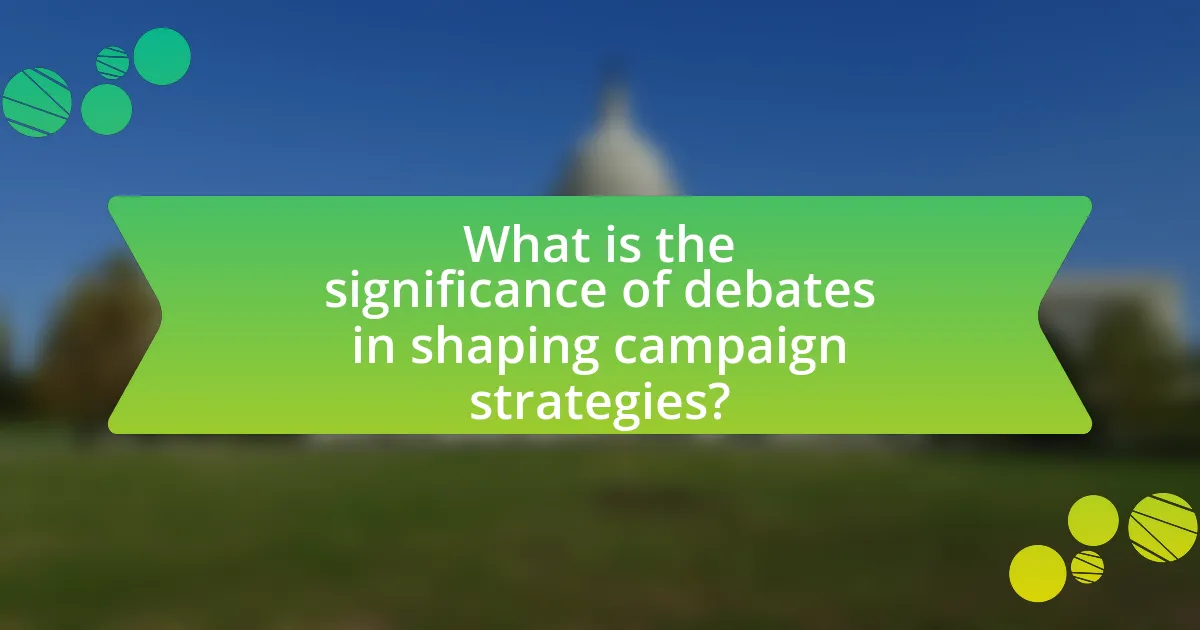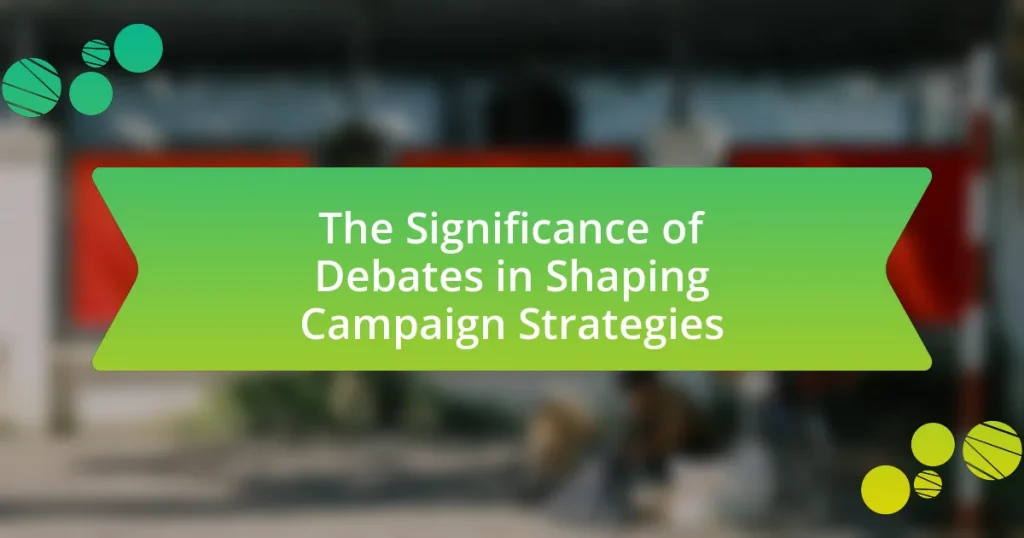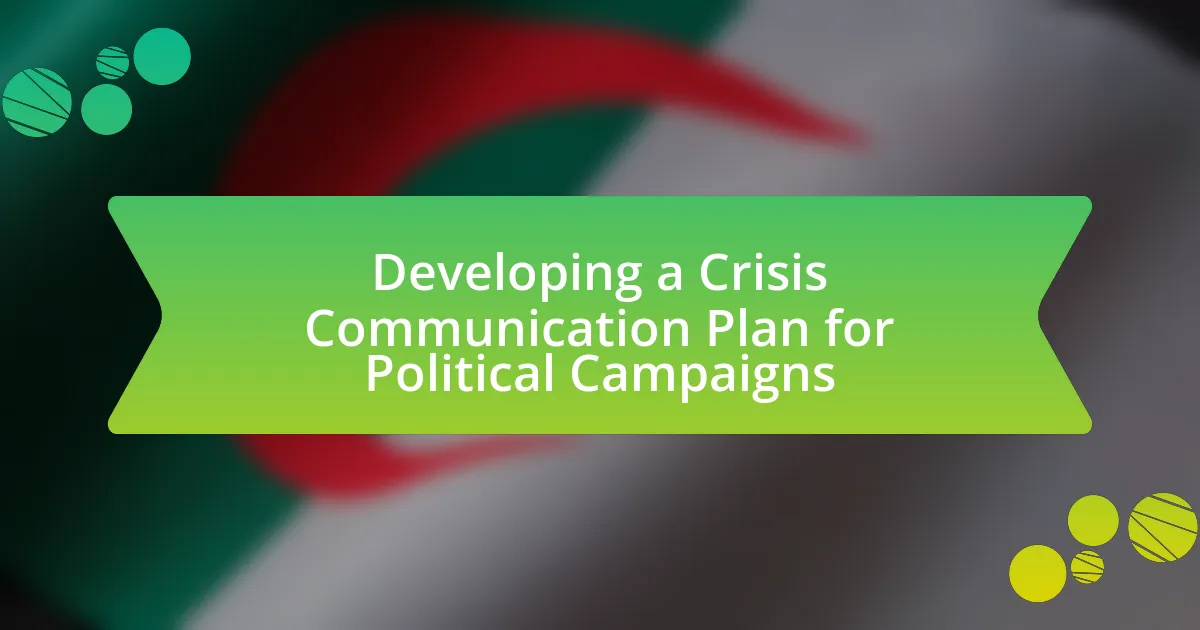Debates play a crucial role in shaping campaign strategies by providing candidates with a platform to communicate their policies, engage with opponents, and connect with voters. They significantly influence public perception, as candidates’ performances can lead to shifts in voter opinions and polling numbers. Historical examples, such as the Kennedy-Nixon debates, illustrate how debates can alter electoral outcomes. Additionally, debates affect media coverage and narrative framing, highlighting key issues and candidate positions. Candidates employ various strategies to enhance their effectiveness in debates, and the outcomes can refine their campaign strategies based on voter reactions and performance metrics.

What is the significance of debates in shaping campaign strategies?
Debates are significant in shaping campaign strategies as they provide candidates with a platform to communicate their policies, engage with opponents, and connect with voters. This interaction allows candidates to showcase their strengths and address weaknesses in real-time, influencing public perception and voter decision-making. Historical evidence, such as the 1960 Kennedy-Nixon debates, illustrates how televised debates can shift voter opinions and alter the trajectory of campaigns, demonstrating their critical role in electoral outcomes.
How do debates influence public perception during campaigns?
Debates significantly influence public perception during campaigns by providing candidates a platform to showcase their policies and personalities directly to voters. This direct engagement allows voters to compare candidates side-by-side, often leading to shifts in opinion based on performance. Research indicates that candidates who perform well in debates can experience a measurable increase in polling numbers; for instance, a study by the Pew Research Center found that 63% of debate watchers reported that the debates helped them form opinions about the candidates. Additionally, debates can highlight key issues, frame narratives, and create memorable moments that resonate with the electorate, further shaping public perception.
What role do candidate performances play in shaping voter opinions?
Candidate performances significantly influence voter opinions by directly affecting perceptions of competence, trustworthiness, and relatability. Research indicates that candidates who perform well in debates often experience a boost in polling numbers, as seen in the 2016 U.S. presidential election, where Donald Trump’s strong debate performances correlated with increased voter support. Additionally, studies show that voters are more likely to remember and be swayed by candidates’ arguments and demeanor during debates, reinforcing the idea that effective performances can shape electoral outcomes.
How do debates affect media coverage and narrative framing?
Debates significantly influence media coverage and narrative framing by providing a structured platform for candidates to present their views, which media outlets then analyze and report on. This exposure often shapes public perception and can lead to the prioritization of specific issues based on candidates’ performances. For instance, after the 2016 U.S. presidential debates, media narratives shifted to focus on candidates’ debate performances, impacting voter opinions and highlighting key topics such as immigration and healthcare. Research by the Pew Research Center indicates that debates can lead to increased media attention on particular issues, thereby framing the narrative around those topics in the public discourse.
Why are debates considered a critical component of political campaigns?
Debates are considered a critical component of political campaigns because they provide candidates with a platform to articulate their policies and engage directly with opponents. This direct engagement allows voters to assess candidates’ communication skills, knowledge, and ability to think on their feet, which are essential qualities for leadership. Historical evidence shows that debates can significantly influence public opinion; for example, the 1960 Kennedy-Nixon debate is often cited as pivotal in shaping the election outcome, as Kennedy’s confident performance on television contrasted sharply with Nixon’s less polished appearance. Thus, debates serve not only as a means of information dissemination but also as a strategic tool that can sway undecided voters and solidify support among constituents.
What historical examples illustrate the impact of debates on election outcomes?
The 1960 presidential debate between John F. Kennedy and Richard Nixon significantly impacted the election outcome, with Kennedy’s televised performance contributing to his victory. Polls conducted after the debate indicated that viewers believed Kennedy had won, which helped shift public perception in his favor. Similarly, the 1984 debate between Ronald Reagan and Walter Mondale showcased Reagan’s effective communication skills, leading to a substantial increase in his approval ratings and ultimately securing his re-election. These examples demonstrate how debates can influence voter opinions and alter the trajectory of electoral campaigns.
How do debates serve as a platform for policy discussion and differentiation?
Debates serve as a platform for policy discussion and differentiation by providing candidates an opportunity to articulate their positions on various issues directly to the public. This format allows for real-time comparison of policies, enabling voters to discern differences in ideology and proposed solutions. For instance, during the 2020 U.S. presidential debates, candidates highlighted contrasting approaches to healthcare, climate change, and economic recovery, which helped voters understand their choices more clearly. The structured environment of debates encourages candidates to defend their policies against direct questioning, further clarifying their stances and revealing the implications of their proposals.
What strategies do candidates employ in debates to enhance their campaign?
Candidates employ several strategies in debates to enhance their campaigns, including effective messaging, audience engagement, and rebuttal techniques. Effective messaging involves clearly articulating key policy positions and personal narratives that resonate with voters, which can be seen in successful candidates who focus on relatable issues. Audience engagement is achieved through direct eye contact, addressing questions from the audience, and using persuasive body language, which helps to create a connection with viewers. Rebuttal techniques are crucial for countering opponents’ arguments; candidates often prepare specific responses to anticipated criticisms, demonstrating their preparedness and ability to think on their feet. These strategies are supported by research indicating that candidates who effectively communicate their messages and engage with the audience tend to perform better in polls following debates.
How do candidates prepare for debates to maximize their effectiveness?
Candidates prepare for debates to maximize their effectiveness by conducting thorough research, practicing responses, and engaging in mock debates. Research involves understanding key issues, opponent positions, and audience concerns, which enables candidates to tailor their messages effectively. Practicing responses helps candidates articulate their points clearly and confidently, while mock debates simulate real debate conditions, allowing candidates to refine their strategies and receive feedback. This preparation is crucial, as studies show that well-prepared candidates tend to perform better in debates, influencing voter perceptions and potentially swaying election outcomes.
What tactics are used to counter opponents during debates?
Debaters use several tactics to counter opponents, including rebuttals, counterarguments, and questioning. Rebuttals involve directly addressing and refuting specific points made by the opponent, often using evidence or logical reasoning to undermine their claims. Counterarguments present an alternative perspective that challenges the opponent’s position, effectively shifting the debate’s focus. Questioning tactics, such as Socratic questioning, aim to expose weaknesses in the opponent’s arguments or assumptions, prompting them to clarify or defend their stance. These tactics are essential in debates, as they help to establish credibility and persuade the audience by demonstrating a thorough understanding of the topic and the opponent’s arguments.
How do debates shape voter engagement and turnout?
Debates significantly enhance voter engagement and turnout by providing a platform for candidates to articulate their policies and positions directly to the electorate. This direct interaction fosters informed decision-making among voters, as they can compare candidates’ views in real-time. Research indicates that debates can increase voter interest; for instance, a study by the Pew Research Center found that 63% of viewers reported being more engaged in the election process after watching a debate. Furthermore, debates often serve as a catalyst for discussions in social circles, amplifying voter motivation to participate in elections.
What demographic factors influence voter interest in debates?
Demographic factors that influence voter interest in debates include age, education level, and political affiliation. Younger voters, particularly those aged 18-29, tend to show less interest in debates compared to older age groups, as evidenced by a 2020 Pew Research Center study indicating that only 36% of younger voters watched the presidential debates, compared to 61% of voters aged 65 and older. Additionally, individuals with higher education levels are more likely to engage with debates; a 2018 study by the American Political Science Review found that college graduates were significantly more likely to follow political debates than those with lower educational attainment. Political affiliation also plays a crucial role; partisan voters are generally more interested in debates that feature their preferred candidates, as shown in a 2020 Gallup poll where 70% of Democrats expressed interest in debates involving Democratic candidates, compared to 50% of Republicans for debates featuring Republican candidates.
How do debates mobilize supporters and undecided voters?
Debates mobilize supporters and undecided voters by providing a platform for candidates to articulate their policies and engage directly with opponents. This direct engagement allows supporters to rally around their candidate’s positions, reinforcing their commitment and enthusiasm. For undecided voters, debates serve as a critical moment for comparison, enabling them to evaluate candidates’ responses, demeanor, and overall appeal in real-time. Research indicates that debates can significantly influence voter perceptions; for instance, a study by the Pew Research Center found that 63% of debate watchers reported that the debates helped them make a decision about whom to support. This dynamic interaction during debates can lead to increased voter turnout and stronger party alignment, as candidates’ performances can sway opinions and energize their base.
What are the potential drawbacks of debates in campaign strategies?
Debates in campaign strategies can lead to several potential drawbacks, including the risk of miscommunication and the possibility of reinforcing negative perceptions. Miscommunication can occur when candidates fail to articulate their positions clearly, leading to voter confusion. For instance, a study by the Pew Research Center found that 62% of viewers felt candidates often used jargon that was difficult to understand, which can alienate potential supporters. Additionally, debates can amplify negative perceptions, as candidates may focus on attacking opponents rather than presenting their own policies, which can result in a backlash from undecided voters. This phenomenon was observed during the 2016 U.S. presidential debates, where aggressive tactics led to increased disapproval ratings for both candidates involved.
How can debates lead to misinterpretations or misinformation?
Debates can lead to misinterpretations or misinformation primarily through the selective presentation of facts and the framing of arguments. Participants may emphasize certain points while downplaying others, which can distort the audience’s understanding of the issues. For instance, during political debates, candidates often use statistics or quotes out of context to support their positions, leading viewers to form skewed perceptions. Research indicates that cognitive biases, such as confirmation bias, further exacerbate this issue, as individuals tend to accept information that aligns with their pre-existing beliefs while dismissing contradictory evidence. This dynamic can result in widespread misinformation, as audiences may share these misinterpretations, perpetuating inaccuracies within public discourse.
What risks do candidates face if they perform poorly in debates?
Candidates face significant risks if they perform poorly in debates, including damage to their public image, loss of voter support, and decreased fundraising opportunities. A poor debate performance can lead to negative media coverage, which can shape public perception and diminish a candidate’s credibility. For instance, a study by the Pew Research Center found that candidates who are perceived as weak in debates often see a decline in poll numbers, as voters may question their competence and ability to lead. Additionally, poor debate outcomes can result in reduced enthusiasm among donors and volunteers, impacting campaign resources and overall strategy.
How can candidates effectively leverage debates for campaign success?
Candidates can effectively leverage debates for campaign success by showcasing their policies, engaging with opponents, and connecting with voters. By clearly articulating their positions and contrasting them with those of their opponents, candidates can highlight their strengths and appeal to undecided voters. Historical data indicates that candidates who perform well in debates often see a boost in polls; for example, the 1984 presidential debate between Ronald Reagan and Walter Mondale significantly impacted voter perception, leading to Reagan’s landslide victory. Additionally, effective candidates utilize debates to address key issues directly relevant to their constituents, thereby enhancing their relatability and credibility.
What best practices should candidates follow when participating in debates?
Candidates should focus on clear communication, thorough preparation, and respectful engagement when participating in debates. Clear communication involves articulating ideas concisely and avoiding jargon, which helps the audience understand the candidate’s positions. Thorough preparation includes researching key issues, anticipating questions, and practicing responses, ensuring candidates can confidently address topics during the debate. Respectful engagement means listening actively to opponents, acknowledging differing viewpoints, and maintaining a professional demeanor, which fosters a constructive debate atmosphere. These practices enhance a candidate’s credibility and effectiveness in conveying their message to voters.
How can candidates use debate outcomes to refine their campaign strategies?
Candidates can use debate outcomes to refine their campaign strategies by analyzing voter reactions and performance metrics from the debates. By assessing which arguments resonated with the audience and identifying weaknesses in their own presentations, candidates can adjust their messaging and focus on key issues that matter to voters. For instance, post-debate polls often reveal shifts in public opinion, indicating which candidate’s points were most persuasive. This data allows candidates to pivot their strategies, emphasizing successful themes while addressing any criticisms or gaps highlighted during the debates.






